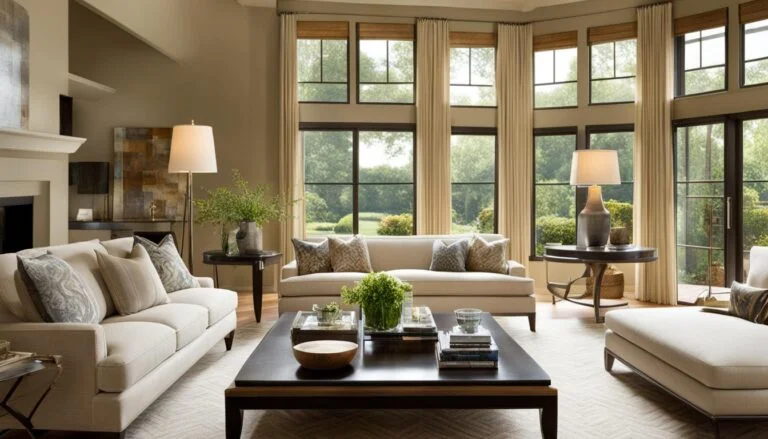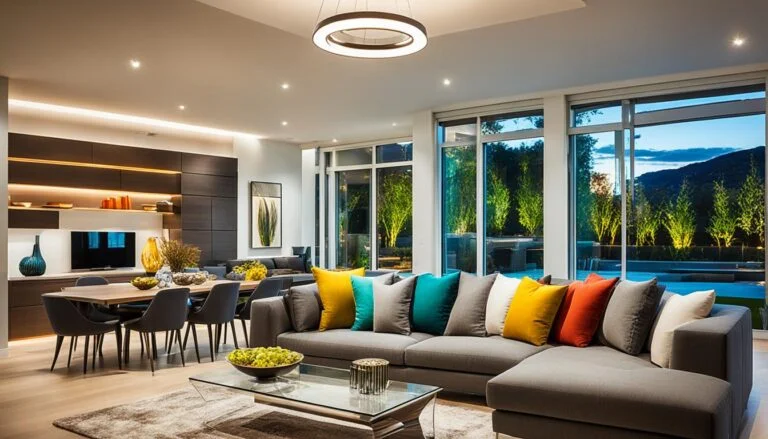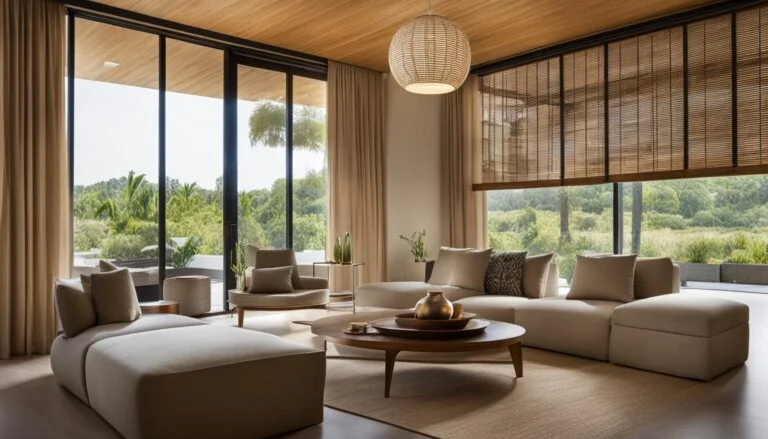Welcome to our guide on creating balanced living spaces through the practice of Feng Shui. If you desire a harmonized and tranquil environment that energizes your home, then you’ve come to the right place. Feng Shui is not just about arranging furniture; it’s about promoting good energy flow and creating a space that nurtures both your body and mind.
Throughout this article, we will share essential Feng Shui tips and tricks that will help you create a clutter-free and harmonious living space. From embracing minimalist decor strategies to incorporating Feng Shui decor techniques, we will guide you towards achieving balance and harmony in your home.
Key Takeaways:
- Embrace minimalism to promote a clutter-free space and better energy flow.
- Incorporate Feng Shui decor techniques that harmonize the elements in your home.
- Utilize creative lighting and color psychology to enhance balance and harmony.
- Embrace compact living solutions for a balanced and efficient lifestyle.
- Implementing these principles can lead to a more balanced and fulfilling lifestyle.
Embrace Minimalist Decor Strategies for Balanced Living Spaces
One of the key aspects of creating a balanced living space is to embrace minimalist decor strategies. Minimalism promotes a clutter-free environment, allowing for better flow of energy within the space. By incorporating sleek furniture design and minimalist color selection, you can achieve a simplified and functional interior. Scandinavian design aesthetics and minimalist principles can serve as inspiration for creating balanced living spaces.
Minimalist decor strategies focus on creating a clutter-free space, promoting a sense of tranquility and harmony. It involves paring down unnecessary items and adopting a clean and uncluttered aesthetic. By removing excess belongings and simplifying the overall design, the space becomes more open and inviting.
Sleek furniture design is an essential element of minimalist interiors. Opting for furniture with clean lines and a streamlined appearance helps create a sense of simplicity and elegance. Choose furniture pieces that are functional and practical, allowing for ease of movement and contributing to the overall flow of the space.
Minimalism is not about sacrificing style or comfort; it’s about embracing simplicity and creating a more mindful and intentional living environment.
When selecting colors for a minimalist interior, stick to a neutral palette with soft tones. Light colors such as white, beige, or light gray help create an airy and spacious feel. These colors also reflect natural light, allowing it to bounce around the room and enhance the overall brightness.
Benefits of Minimalist Decor Strategies:
- Promotes a calm and serene environment
- Allows for better energy flow and balance
- Creates a visually appealing and uncluttered space
- Encourages a more mindful and intentional approach to living
By embracing minimalist decor strategies, you can transform your living space into a clutter-free oasis that fosters relaxation and balance.
Incorporate Feng Shui Decor Techniques for Balance and Harmony
Feng Shui decor techniques have the power to transform your living spaces into harmonious environments that promote balanced energy flow. By understanding and implementing the principles of Feng Shui, you can create a zen-inspired interior that nurtures your well-being.
The foundation of Feng Shui lies in the concept of the five elements—fire, earth, metal, water, and wood—each representing different aspects of life and energy. By incorporating these elements strategically throughout your home, you can achieve balance and harmony in your living spaces.
For example, adding plants in the Eastern or Southeast portion of a room aligns with the wood element, which promotes growth, vitality, and positive energy. These plants can be potted flowers, bamboo, or other greenery that adds a touch of nature to your space. By incorporating natural elements, you create a connection with the earth, fostering a sense of grounding and tranquility.
The use of light is also an important aspect of Feng Shui. Light represents the fire element and is crucial for energizing and replenishing a space. Natural light is ideal, so consider opening curtains or blinds during the day to let light stream into your living areas. Additionally, you can incorporate artificial lighting fixtures strategically to create a warm and inviting ambiance.
Here are some Feng Shui decor techniques to help you achieve balance and harmony:
| Feng Shui Decor Techniques | Description |
|---|---|
| Decluttering | Creating a clutter-free space allows for the smooth flow of energy and promotes a calm and peaceful environment. |
| Proper Furniture Placement | Arranging furniture to optimize the flow of energy and create a balanced layout in each room. |
| Color Selection | Choosing colors that align with Feng Shui principles can enhance the energy and mood of a space. |
| Mirror Placement | Placing mirrors strategically to reflect and amplify positive energy throughout the room. |
By incorporating these Feng Shui decor techniques, you can create a balanced and harmonious living space that promotes positive energy flow and a sense of peace. Remember, the key is to align your environment with the natural elements and principles of Feng Shui to cultivate a serene and inspiring atmosphere.
Implement Creative Lighting and Color Psychology for Enhanced Balanced Living Spaces
When it comes to creating a harmonious living space, lighting is a key element that should not be overlooked. Creative lighting techniques can greatly enhance the balance and positive energy flow in your home. By incorporating different intensities of light and ensuring even distribution throughout a room, you can create a soothing and inviting atmosphere.
Furthermore, understanding color psychology and its impact on our emotions can greatly contribute to the overall balance and harmony of a space. Different colors have the power to evoke specific feelings and moods. By carefully selecting colors that promote a sense of relaxation and balance, you can create a harmonious environment that nurtures both the body and mind.
Innovative color selection can be influenced by the principles of Feng Shui, which emphasize the importance of color in creating a balanced living space. Each color has its own significance and meaning, and by incorporating the right colors in different areas of your home, you can enhance the desired mood and energy.
Color Psychology in Design
| Color | Meaning |
|---|---|
| Blue | Calming, promotes relaxation |
| Green | Harmony, balance, growth |
| Yellow | Happy, energetic |
| Red | Passion, excitement |
| Purple | Creativity, spirituality |
| Neutral tones | Peaceful, versatile |
By strategically incorporating these colors into different rooms, you can create an environment that aligns with the desired energy and ambiance. For instance, using calming blue tones in the bedroom promotes relaxation and better sleep, while energetic yellow hues work well in the kitchen or home office.
Remember, balance and harmony are key in creating a peaceful living space. By implementing creative lighting techniques and understanding the psychology of color, you can transform your home into a sanctuary that nurtures well-being and promotes positive energy flow.
Embrace Compact Living Solutions for a Balanced Living Spaces Lifestyle
In today’s fast-paced world, where space is often limited, finding practical and efficient living solutions is vital to creating balanced living spaces. Embracing compact living not only maximizes the functionality of each space but also fosters a sense of harmony and tranquility. By incorporating functional minimalism and eco-friendly interior design principles, you can achieve a well-balanced and sustainable lifestyle.
Functional minimalism, the philosophy of owning only what you truly need and organizing your belongings thoughtfully, promotes a clutter-free environment. By decluttering your living space and creating intentional storage solutions, you free up valuable space and allow for better energy flow. This minimalistic approach to design not only creates a visually appealing atmosphere but also reduces mental clutter, promoting a more serene and focused mindset.
Eco-friendly interior design plays a crucial role in creating balanced living spaces. By choosing sustainable materials and incorporating energy-efficient solutions, you reduce your carbon footprint and promote a harmonious relationship with the environment. Incorporate natural elements such as organic textiles, reclaimed wood, and indoor plants to bring the beauty of the outdoors into your compact living space. This connection with nature enhances the overall well-being while aligning with eco-friendly principles.
Benefits of Embracing Compact Living Solutions
- Maximized functionality and organization
- Reduced clutter leading to a peaceful environment
- Improved energy flow and overall harmony
- Reduced environmental impact through sustainable practices
By embracing compact living solutions, you can create a well-organized and harmonious living space that heightens your overall sense of well-being.
To illustrate the effectiveness of compact living solutions, consider the following table:
| Living Space | Traditional Design | Compact Living Solution |
|---|---|---|
| Living Room | Large, bulky furniture | Multi-functional furniture (e.g., sofa bed, storage ottoman) |
| Bedroom | Cluttered closet and limited storage | Space-saving storage solutions (e.g., under-bed storage, wall-mounted shelves) |
| Kitchen | Excessive countertop appliances and limited cabinet space | Minimalist kitchen gadgets and optimized storage |
As seen in the table above, compact living solutions allow for more efficient use of space, resulting in a clutter-free and balanced living environment.
Embracing compact living solutions, incorporating functional minimalism, and adopting eco-friendly interior design principles can transform your home into a haven of balance and harmony.
Conclusion
In conclusion, creating balanced living spaces is achievable by incorporating essential Feng Shui tips and tricks. By embracing minimalist decor strategies, incorporating Feng Shui decor techniques, utilizing creative lighting and color psychology, and embracing compact living solutions, you can achieve a harmonious and tranquil environment in your home.
By promoting balance and positive energy flow, you can create a space that nurtures and energizes both the body and the mind. Minimalist decor strategies and compact living solutions help declutter and maximize functionality, creating a serene and efficient lifestyle.
Implementing these principles not only enhances the aesthetic appeal of your home but also provides a sense of tranquility and well-being. By paying attention to the placement of furniture, incorporating natural elements, and choosing calming colors, you can create a space that promotes balance and harmony.
So, whether you are looking to redesign your current living space or planning a new home, consider these Feng Shui tips and tricks to achieve balanced living spaces that enhance your overall well-being and create a harmonious environment.
FAQ
What is Balanced Living Spaces?
Feng Shui is the practice of arranging the furniture and components of a living space to promote good energy and create a harmonious environment.
How can I create a balanced living space?
To create a balanced living space, you can embrace minimalist decor strategies, incorporate Feng Shui decor techniques, utilize creative lighting and color psychology, and embrace compact living solutions.
What are some minimalist decor strategies?
Minimalist decor strategies include creating a clutter-free space, incorporating sleek furniture design, and selecting minimalist colors.
How can Feng Shui decor techniques contribute to balance and harmony?
By considering the five elements of Feng Shui and incorporating them into the corresponding areas of your home, you can achieve balance and harmony. Examples include adding plants to promote the wood element and using light to represent the fire element.
How can creative lighting and color psychology enhance balance?
By using creative lighting techniques, you can enhance the positive energy flow in your home. Understanding color psychology and selecting colors that promote balance and relaxation also contributes to creating a harmonious environment.
What are some compact living solutions?
Compact living solutions involve embracing functional minimalism, decluttering and organizing, and incorporating eco-friendly interior design principles to maximize space and promote a balanced lifestyle.












